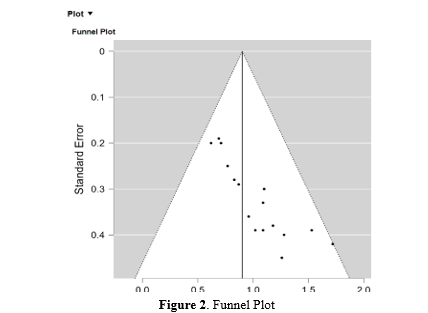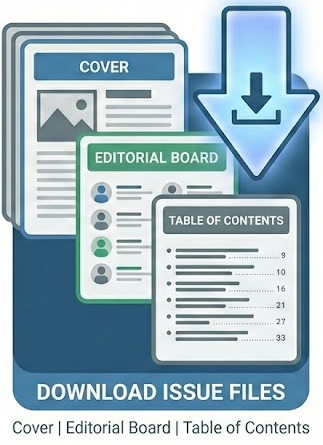The Effect of Cognitive Behavioral Therapy on Anxiety and Depression Among Students in Science Education: A Meta-Analysis
DOI:
https://doi.org/10.30736/seaj.v7i1.1188Keywords:
Cognitive Behavioral Therapy, Anxiety, Depression, Science Education, Meta-analysisAbstract
The Effect of Cognitive Behavioral Therapy on Anxiety and Depression Among Students in Science Education: A Meta-Analysis. This meta-analysis aims to evaluate the impact of Cognitive Behavioral Therapy (CBT) on anxiety and depression specifically within the context of science learning. This study was conducted by integrating and evaluating the results of previous relevant studies to provide a comprehensive understanding of the effectiveness of CBT in dealing with mental health problems in the adolescent population. The study sample consisted of 16 studies published between 2010 and 2023, which met inclusion criteria, such as experimental or quasi-experimental design, use of standardized scales to measure anxiety and depression, and a focus on CBT interventions. The meta-analysis revealed a significant positive effect of CBT on reducing anxiety and depression in science learning contexts (d = 0.945; z = 7.052; p < 0.001)."These findings support the use of CBT as a key approach in mental health interventions for adolescents, particularly in the context of education and primary health services.
Downloads
References
Asnur, L., Jalinus, N., Faridah, A., Apra, T., Ambiyar, R. D., & Utami, F. (2024). Video-blogs ( Vlogs ) -based Project : A Meta Analysis. 14(5), 1553–1557.
Badawi et al. (2023). Integration of Blended Learning and Project-Based Learning (BPjBL) on Achievement of Students’ learning goals: A Meta-analysis study. Pegem Journal of Education and Instruction, 13(4). https://doi.org/10.47750/pegegog.13.04.32
Borenstein, M., Hedges, L., & Rothstein, H. (2007). Introduction to Meta-Analysis. www.Meta-Analysis.com
Byrne, S., Cobham, V., Richardson, M., & Imuta, K. (2023). Do Parents Enhance Cognitive Behavior Therapy for Youth Anxiety? An Overview of Systematic Reviews Over Time. Clinical Child and Family Psychology Review, 26(3), 773–788. https://doi.org/10.1007/s10567-023-00436-5
Compton, S. N., March, J. S., Brent, D., Albano, A. M., Weersing, V. R., & Curry, J. (2004). Cognitive-behavioral psychotherapy for anxiety and depressive disorders in children and adolescents: An evidence-based medicine review. Journal of the American Academy of Child and Adolescent Psychiatry, 43(8), 930–959. https://doi.org/10.1097/01.chi.0000127589.57468.bf
Cristea, I. A., Kok, R. N., & Cuijpers, P. (2015). Efficacy of cognitive bias modification interventions in anxiety and depression: Meta-analysis. British Journal of Psychiatry, 206(1), 7–16. https://doi.org/10.1192/bjp.bp.114.146761
Cuijpers, P., Berking, M., Andersson, G., Quigley, L., Kleiboer, A., & Dobson, K. S. (2013). A meta-analysis of cognitive-behavioral therapy for adult depression, alone and in comparison with other treatments. Canadian Journal of Psychiatry, 58(7), 376–385. https://doi.org/10.1177/070674371305800702
Cuijpers, P., Smit, F., Bohlmeijer, E., Hollon, S. D., & Andersson, G. (2010). Efficacy of cognitive-behavioral therapy and other psychological treatments for adult depression: Meta-analytic study of publication bias. British Journal of Psychiatry, 196(3), 173–178. https://doi.org/10.1192/bjp.bp.109.066001
Dewanto, D., Wantu, H. M., Dwihapsari, Y., Santosa, T. A., & Agustina, I. (2023). Effectiveness of The Internet of Things (IoT)-Based Jigsaw Learning Model on Students’ Creative Thinking Skills: A- Meta-Analysis. Jurnal Penelitian Pendidikan IPA, 9(10), 912–920. https://doi.org/10.29303/jppipa.v9i10.4964
Edy Nurtamam, M., Apra Santosa, T., Aprilisia, S., Rahman, A., & Suharyat, Y. (2023). Meta-analysis: The Effectiveness of Iot-Based Flipped Learning to Improve Students’ Problem-Solving Abilities. Jurnal Edumaspul, 7(1), 2023–1492.
Ekers, D., Richards, D., & Gilbody, S. (2008). A meta-analysis of randomized trials of behavioral treatment of depression. Psychological Medicine, 38(5), 611–623. https://doi.org/10.1017/S0033291707001614
Frederick, J., Ng, M. Y., Valente, M. J., Chorpita, B. F., & Weisz, J. R. (2023). Do specific modules of cognitive behavioral therapy for depression have measurable effects on youth internalizing symptoms? An idiographic analysis. Psychotherapy Research, 33(3), 265–281. https://doi.org/10.1080/10503307.2022.2131475
Golshani, F., Mirghafourvand, M., Hasanpour, S., & Biarag, L. S. (2020). The effect of cognitive behavioral therapy on anxiety and depression in Iranian infertile women: A systematic and meta-analytical review. Iranian Journal of Psychiatry and Behavioral Sciences, 14(1), 1–8. https://doi.org/10.5812/ijpbs.96715
Hallion, L. S., & Ruscio, A. M. (2011). A Meta-Analysis of the Effect of Cognitive Bias Modification on Anxiety and Depression. Psychological Bulletin, 137(6), 940–958. https://doi.org/10.1037/a0024355
Hofmann, S. G., & Smits, J. A. J. (2008). Cognitive-behavioral therapy for adult anxiety disorders: A meta-analysis of randomized placebo-controlled trials. Journal of Clinical Psychiatry, 69(4), 621–632. https://doi.org/10.4088/jcp.v69n0415
Ichsan, I., Suharyat, Y., Santosa, T. A., & Satria, E. (2023). Effectiveness of STEM-Based Learning in Teaching 21st Century Skills in Generation Z Student in Science Learning: A Meta-Analysis. Jurnal Penelitian Pendidikan IPA, 9(1), 150–166. https://doi.org/10.29303/jppipa.v9i1.2517

Downloads
Published
How to Cite
Issue
Section
License
Copyright (c) 2025 Nur Hasan, Riza Noviana Khoirunnisa, Mohammad Edy Nurtamam, Rizal Ula Ananta Fauzi, Tomi Apra Santosa, Aat Ruchiat Nugraha, Diah Fatma Sjoraida, Ahmad Zain Sarnoto

This work is licensed under a Creative Commons Attribution-ShareAlike 4.0 International License.
Authors who publish with this journal agree to the following terms:
- Authors retain copyright and grant the journal right of first publication with the work simultaneously licensed under a Creative Commons Attribution-ShareAlike 4.0 International License that allows others to share the work with an acknowledgment of the work's authorship and initial publication in this journal.
- Authors are able to enter into separate, additional contractual arrangements for the non-exclusive distribution of the journal's published version of the work (e.g., post it to an institutional repository or publish it in a book), with an acknowledgment of its initial publication in this journal.
- Authors are permitted and encouraged to post their work online (e.g., in institutional repositories or on their website) prior to and during the submission process, as it can lead to productive exchanges, as well as earlier and greater citation of published work (See The Effect of Open Access).

This work is licensed under a Creative Commons Attribution-ShareAlike 4.0 International License.








